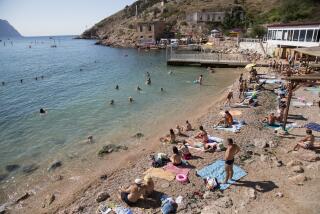COLUMN RIGHT / WALTER LAQUEUR : Independence May Enslave Millions : The rush toward national separatism is an invitation to economic ruin and to undemocratic rulers.
- Share via
During World War I, a German professor wrote an influential book in which he suggested that the Russian empire should, like an orange, be sliced into its component parts. It wasn’t a brilliant idea then; it isn’t one now. The current rush for full sovereignty at any price is self-defeating; those involved may live to regret it.
The Soviet Union was populated by several dozen major and several hundred minor nationalities. In principle, every single one of them has the right of self-determination, including the Abasins, the Budug, of whom there were 1,000 when last counted, and the Ainu--total number 32--in Sakhalin. They should have their own schools, museums and publishing houses, perhaps even television stations. But not all of them need their own armed forces, currency, stamps, passports, flags, embassies, national airlines and the other trappings of sovereignty.
Deutsche Bank, in assessing the economic viability of the newly independent republics, found that their prospects--with the exceptions of Russia, the Ukraine and possibly the Baltics--range from highly doubtful to nonexistent. But even for the Ukraine and the Baltics, the going will be very rough. There is no demand in Western Europe for food imports, steel or other industrial products of the East.
Earlier this year, a Soviet journal listed 75 acute national conflicts in the “former” Soviet Union. The number has grown tenfold as a result of the rush to independence. Every republic has justifiable territorial claims against its neighbors. The old borders inside the Soviet Union were drawn arbitrarily; they did not really matter, because all power was concentrated in the center. But from now on, the borders will matter a great deal.
Some border disputes can perhaps be solved peacefully, but most cannot. Twenty-four million Russians, for example, live outside the Russian republic. There are as many Russians in Kazakhstan as there are Kazakh, but the Kazakh do not want to give up one inch of their territory and they have threatened Russia with war. Substantial parts of the Ukraine are also Russian in character. The Crimea originally belonged to Russia until after World War II, when it passed into the hands of the Ukraine. The Tartars want a Crimean republic of their own because they lived there even before the Russians came. There are 7 million Tartars--more than Norwegians or Finns or Swiss. Why deny them their rights?
The demand for independence is taking precedence over political freedom and human rights. Azerbaijan, Turkmenistan, Tadzhikistan and Uzbekistan sought independence mainly to preserve the old communist dictatorship. The situation in White Russia, Kirghizia and Kazakhstan is more complicated, but the prospects for democracy there are still dim.
Georgia is one of the few republics with a long history and culture. But the new Georgia is authoritarian in character and has not the slightest wish to acknowledge the rights of the minorities--the Abkhazinians and the Ossetians--on its territory.
The Ukraine is presided over by Leonid Kravchuk, a rabid anti-communist who has banned the Communist Party--of which he was a leading member until a week ago. His conversion must have been as radical as it was rapid.
The current triumph of national separatism, then, is an invitation to economic ruin and to the emergence of new undemocratic entities, most of which are not viable in any meaningful sense. To a large extent, this is the fault of generations of Soviet leaders who claimed that the “national question” had been solved. Even as recently as two years ago, a more farsighted leadership could have established a new framework that would have gone a long way toward satisfying the major and minor nationalities. Now, it is too late. The various new entities and separatist movements will have to learn the hard way that there are limits to independence and sovereignty even for great nations, let alone the smaller ones.
Politics, like Nature, does not suffer a vacuum. Within a year or two following, for instance, a breakdown in fuel supplies, the ruinous political and economic consequences will be obvious to all but the greatest fanatics. The republics will look for new agreements that, by necessity, will mean surrendering some of their newly gained sovereignty. A temporary agreement has been reached, but there is no telling what will come of it in the end. A leading role will have to be played by the bigger nations, above all by the Russians. Boris Yeltsin will need a great deal of tact to overcome the traditional suspicions of Great Russian chauvinism.
More to Read
Sign up for Essential California
The most important California stories and recommendations in your inbox every morning.
You may occasionally receive promotional content from the Los Angeles Times.












